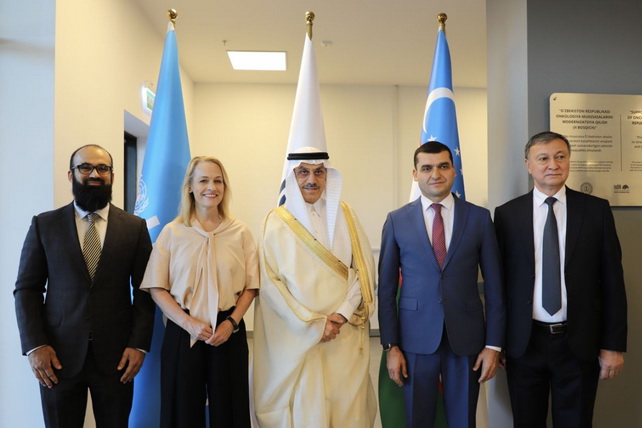
Uzbekistan, IsDB, and UNOPS Advance Cancer Care with Modern Facilities and Equipment
Uzbekistan, IsDB, and UNOPS Advance Cancer Care with Modern Facilities and Equipment
Tashkent, Uzbekistan (UzDaily.com) — Thousands of cancer patients across Uzbekistan will benefit from new equipment and expanded oncology and radiology services thanks to a joint initiative by the Government of Uzbekistan, the Islamic Development Bank (IsDB), and UNOPS.
The project, financed through a US$90 million IsDB loan and co-financing from the Uzbek government, and implemented with the participation of UNOPS, WHO, IAEA, and IARC in close coordination with the Ministry of Health, aims to directly assist at least 150,000 cancer patients nationwide.
It is expected that outpatient oncology consultations will increase by 40%, inpatient capacity by 20%, and more than 2,200 doctors, nurses, and technical specialists will be trained.
Today, the partners visited the Republican Specialized Scientific and Practical Medical Center of Oncology and Radiology in Tashkent to review progress in modernizing facilities, technology, and patient care. The delegation included Uzbekistan’s Minister of Health Asilbek Khudoyarov, IsDB President Dr. Muhammad Suleiman Al Jasser, UNOPS Deputy Executive Director for Implementation and Partnerships Kirstin Damkier, and Center Director Professor Mirzagolib Tillashaykhov.
During a briefing, the Ministry of Health emphasized that strengthening oncology services remains a national healthcare priority. The Center’s director presented recent achievements and ongoing collaboration with IsDB and UNOPS, demonstrating significant progress. Fourteen hospitals across the country are now equipped with modern devices for cancer diagnosis and treatment, with over 1,700 medical devices supplied under the partnership.
The delegation toured key departments, including radiotherapy, nuclear medicine, endoscopy, and medical imaging, where specialists showcased recently installed technologies—linear accelerators, MRI and PET/CT scanners, and digital mammography systems. These technologies are already saving lives by enabling earlier detection and precise treatment.
For IsDB, investment in inclusive healthcare systems aligns with its Member Country Partnership Strategy (2022–2026), emphasizing human capital development to support sustainable growth.
IsDB President Dr. Muhammad Al Jasser praised the initiative as an example of international solidarity and cooperation: “Today, the fight against cancer is about using technology to bring hope and save lives. Through this partnership, IsDB and the Government of Uzbekistan have combined the collective efforts of UNOPS, WHO, IAEA, and IARC to do much more than just build a medical facility. We are revolutionizing the entire oncology care system in the country. This center will provide advanced treatment, expand early detection, and deliver critical care to more patients than ever before.”
A key focus of the joint project is the expansion of radiotherapy services. For the first time, modern linear accelerators have been installed in oncology centers, enabling highly precise treatments that target tumors while minimizing exposure to healthy tissue. This reduces side effects, shortens waiting times, and allows patients to receive effective cancer care without traveling abroad.
Advanced technologies, such as adaptive radiotherapy, improve survival rates for previously untreatable cancers, enhancing both patient outcomes and quality of life.
UNOPS Deputy Executive Director Kirstin Damkier highlighted the importance of collaboration: “This project is a clear example of how strong partnerships between national institutions and international partners can deliver modern, accessible solutions that truly change people’s lives. In Uzbekistan, thousands of patients are already benefiting from advanced diagnostics, timely treatment, and improved care, paving the way for longer, healthier lives.”
The visit concluded with partners reaffirming support for Uzbekistan’s ambitious healthcare reforms under the Uzbekistan-2030 strategy. Together, they committed to expanding cancer prevention programs, early detection initiatives, and patient-centered medical services to ensure more people receive timely and high-quality healthcare.